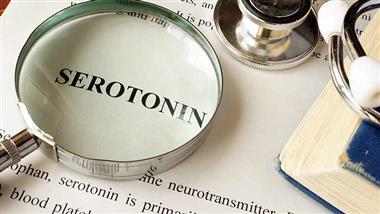by Dr. Joseph Mercola, Mercola:

STORY AT-A-GLANCE
- Serotonin, often misconstrued as the “happy hormone,” acts as an antimetabolite, hindering energy production in your mitochondria, which can result in fatigue, slowed metabolism and weight gain
- Mainstream media, influenced by pharmaceutical interests, distorts research findings to perpetuate the narrative of serotonin as the “happy hormone.” This is exemplified by recent misreporting on dementia research
TRUTH LIVES on at https://sgtreport.tv/
- Contrary to media portrayal, recent research links high serotonin levels, not low, to dementia
- Other adverse effects of serotonin include fibrosis, impaired thyroid function, metabolic dysregulation, oxidative stress and psychological impacts such as insomnia and depression
- For optimal health, you want to keep your serotonin level low. One way to do that is by increasing GABA, which is available as a supplement, as GABA increases the degradation rate of serotonin. Dietary strategies are also reviewed
Serotonin, routinely misrepresented as the “happy hormone,” is actually an antimetabolite, meaning it suppresses your body’s ability to create energy in the electron transport chain of your mitochondria. As a result, high serotonin can lead to fatigue, a slower metabolism and weight gain.
The drug industry has a strong incentive to suppress bad press about serotonin, however, as most antidepressants on the market today capitalize on the idea that low serotonin in your brain is responsible for depression.
Media Misrepresents Study Findings Linking High Serotonin to Dementia
That may well be why the mainstream media — bought and paid for by the pharmaceutical industry — so blatantly misreported research1,2 linking high serotonin to dementia. Bioenergetic researcher Georgi Dinkov writes:3
“STUDY: high serotonin linked to dementia; MEDIA: low serotonin linked to dementia.4,5 Once again, a level of misreporting that I am much more included to ascribe to malice than incompetence simply because most of the popular press outlets covering a specific scientific study get the study authors to proof-read the press article before publishing.
So, for patently false press articles like that to appear is most likely due to an attempt to preserve the status of serotonin as the ‘happy hormone,’ as well as to delay/prevent the avalanche of lawsuit for iatrogenic dementia from all people taking SSRI and other serotonergic drugs.
In summary, the actual study found that low levels of the serotonin transporter (SERT) — the sodium-dependent protein responsible for uptake and deactivation of serotonin — were associated with cognitive impairment (which usually develops into full-blown dementia/Alzheimer with age).
In other words, higher extracellular serotonin levels were associated with dementia. The press articles state the exact opposite — that lower levels of the ‘happiness’ hormone serotonin were associated with dementia …
[The] study also suggests the prevention of dementia/Alzheimer may be as simple as eating some extra salt (providing the required sodium co-factor of SERT), or using a serotonin antagonist.
Air ionizers, which also tend to decrease extracellular serotonin may be helpful too and can provide benefit 24×7 without any conscious effort on behalf of the person/people using them.”
In simpler terms, the study discovered that having low levels of SERT is linked to problems with memory and thinking skills, which can eventually lead to dementia or Alzheimer’s disease.
Here’s why: SERT is like a “clean-up crew” in the brain. It helps remove excess serotonin, which is a chemical messenger in the brain. When there’s not enough SERT around to do its job, serotonin levels outside of brain cells can rise too high. This excess serotonin floating around can cause trouble and contribute to problems with memory and thinking.
So, when the study talks about “low SERT” being associated with cognitive problems, it really means that having less of this clean-up crew leads to higher levels of serotonin outside brain cells. And higher levels of serotonin outside brain cells are linked to dementia.
But some news articles got it all mixed up and said the opposite — that lower levels of “serotonin” were tied to dementia. That’s not right. They’re confusing “serotonin” with SERT. Low SERT leads to having too much serotonin hanging around where it shouldn’t be, and that’s what’s deteriorating brain health.
Other Adverse Effects of Serotonin
High serotonin can also cause other adverse health effects. As mentioned, it acts as an antimetabolite, so it impairs your mitochondrial energy production, and this can contribute to and worsen just about any health condition you can think of. For example, elevated serotonin can contribute to:
- Fibrosis, including cardiac and pulmonary fibrosis
- Impaired thyroid function
- Reduced metabolism due to excessive glycolysis and high lactic acid production
- Reductive and then secondary oxidative stress
- Bizarre, recurring nightmares and post-traumatic stress disorder (PTSD)



